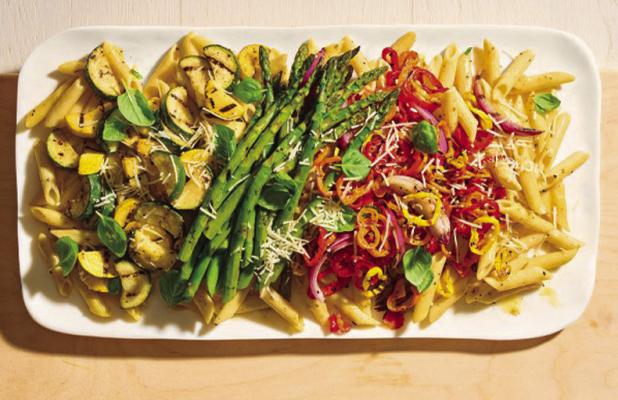Diet and Cancer
By 2040, there will be 29.5 million new cancer cases each year in the United States, according to the International Agency for Research on Cancer. The good news? There’s still time to prevent many of these cases by adopting healthy lifestyle patterns.
While cancer prevention is still being researched, we know chances of developing cancer can be affected by the lifestyle choices you make. New research shows as many as one-third of all cancer deaths are linked to diet and physical activity. Besides quitting smoking and protecting your skin from damaging UV rays, some of the most important things to do to help reduce your cancer risk are eating right and being physically active on a regular basis throughout life.
Can a healthy lifestyle prevent cancer or its recurrence?
In a study of 1,340 patients with high-risk breast cancer, strongest adherence to American Cancer Society and American Institute of Cancer Research prevention recommendations was associated with a 37% reduced hazard of breast cancer recurrence and a 58% reduced hazard of mortality. The study was published May 2023 in the Journal of the American Medical Association.
These findings suggest that education and implementation strategies to help patients adhere to cancer prevention recommendations throughout the cancer care continuum may be warranted in breast cancer in this study -- and for other cancers as well. The bottom line is it’s never too late to start eating healthy.
Here are the recommendations the study used to help reduce cancer risk.
-- Eat a variety of fruits and vegetables which are linked with a lower risk of certain cancers. Fill half your plate each meal with a variety of colorful fruits and vegetables.
-- Eat fewer foods that are highly processed and low in nutrients. Filling up on foods with added sugars and saturated fats leaves little room for nutrient-dense, cancerpreventive foods. Choose fewer sugar-sweetened beverages. You can still enjoy the foods you love, but the foods you eat should consist mostly of whole grains, vegetables, fruit, nuts, seeds and lean protein foods.
-- Focus on plant proteins. Beans and lentils are nutritious and affordable sources of protein and dietary fiber. Research links high intakes of red, processed and charred meat with increased cancer risk, so eat these sparingly.
-- Limit alcohol. Evidence suggests all types of alcoholic drinks may increase your risk of breast, colorectal and other forms of cancer. If you’re of legal drinking age and choose to drink, limit alcoholic beverages to one drink or less per day for women and two drinks or less per day for men on days that alcohol is consumed.
-- Engage in physical activity for 30 minutes a day for a total of 150 minutes a week.
-- Maintain a healthy body weight.
Q and A
Q: Are there specific foods that can help beat a summer cold?
A: Diet does play a key role in our ability to ward off sickness, as our body’s immune response relies on the availability of several key nutrients. Add foods high in vitamin C -- an antioxidant shown to reduce the duration of colds -- vitamin D and foods high in fiber. Research finds that high levels of vitamin D were associated with a lower risk of infections of the upper respiratory tract, such as colds. A higher fiber diet that includes fruits, vegetables, whole grains and legumes supports beneficial microbes that break down fibers and stimulate immune cell activity. While there are no superfoods, a variety of pineapple, tomatoes, spinach, mushrooms, ginger, yogurt, citrus fruit and garlic are all part of a healthy diet that will boost your immune system.
RECIPE
This zesty marinated vegetable pasta salad is a great way to celebrate summer’s bounty and the best from your local farmers market. It works as a dish to bring to a block party or family reunion.
ZESTY MARINATED VEGETABLE PASTA SALAD
Servings: 16 (3/4 cup each) One 12-ounce bottle lemon pepper marinade with lemon juice (1 1/2 cups), divided 1 tablespoon plus 1 teaspoon chili oil, divided 3 cloves garlic, minced 1/4 teaspoon kosher salt 1 medium yellow summer squash, cut into 1/2-inch thick slices 1 medium zucchini, cut into 1/2-inch thick slices 1 pound asparagus, trimmed 2 cups sliced mini sweet peppers 1/2 medium red onion, thinly sliced One 16-ounce package mostaccioli pasta Nonstick cooking spray 1/4 cup Romano shredded cheese Fresh basil for garnish In large bowl, whisk together 1 cup marinade, 1 tablespoon chili oil, garlic and salt; add summer squash, zucchini, asparagus, sweet peppers and onion. Toss to coat. Marinate in refrigerator for 30 minutes to 2 hours. Cook pasta in boiling water according to package directions. Drain; set aside to cool. Preheat charcoal or gas grill for direct heat (350 degrees). Spray grill basket with nonstick spray; set aside. Transfer vegetables from bowl to prepared grilling basket, using tongs to shake off excess marinade; reserve marinade mixture in bowl. Grill vegetables for 12 to 16 minutes or until slightly charred and crisp-tender, stirring frequently. Remove from grill; cool slightly. Add cooked pasta to reserve marinade mixture in bowl; add remaining 1/2 cup marinade and 1 teaspoon chili oil; toss pasta to coat. Transfer pasta to large serving platter. Top with grilled vegetables and cheese. Garnish with basil, if desired.
Per serving: 150 calories, 5 g protein, 27 g carbohydrates, 2 g fat (0 saturated), 0 cholesterol, 2 g fiber, 4 g sugar (0 added), 640 mg sodium.
(Recipe from Hy-Vee Seasons Magazine)
Charlyn Fargo is a registered dietitian with SIU Med School in Springfield, Illinois, and the current president of the Illinois Academy of Nutrition and Dietetics. For comments or questions, contact her at charfarg@aol.com or follow her on Twitter @NutritionRD. To find out more about Charlyn Fargo and read features by other Creators Syndicate writers and cartoonists, visit the Creators Syndicate website at www.creators.com.


